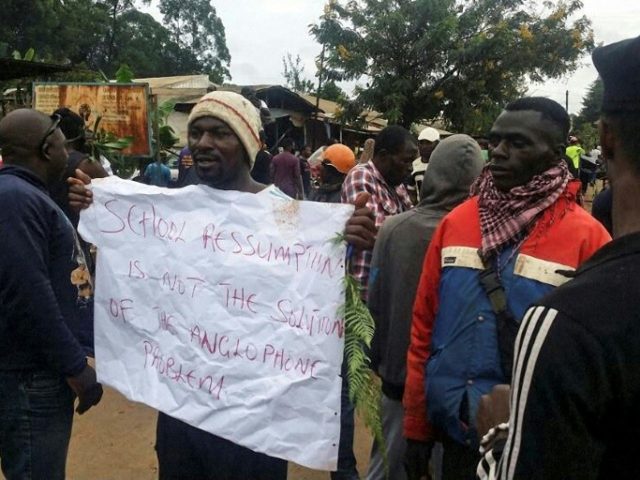This morning’s key headlines from GenerationalDynamics.com
- Dozens killed in English-speaking Cameroon region by French-speaking government police
- US Ambassador Peter Barlerin accuses Cameroon government of ‘targeted killings’
Dozens killed in English-speaking Cameroon region by French-speaking government police

Youth wearing a T-shirt protesting the ‘Francophonization’ of Anglophones (Deutsche Welle)
Twenty-two people were killed on Friday in the Anglophone (English-speaking) region of Cameroon by army and security forces from the Francophone (French-speaking) government of 85-year-old president Paul Biya, who has been in power for more than 35 years.
This is the latest violence in a growing civil war in the Southern Cameroons, the Anglophone region of Cameroon.
The violence started in November 2016, when peaceful protests began with claims by Anglophone lawyers that the legal and court systems are biased toward Francophones, with many laws passed without even being translated into English. Anglophone teachers joined in, protesting that all courses in the schools had to be taught in French and that any use of English was forbidden. The Francophone police responded by committing atrocities.
The atrocities by Francophone security forces grew during 2017 and took a particularly dangerous turn on September 22. What always happens in these situations – as I have described in Syria, Cambodia, Burundi, and a number of other countries – is that government officials feel threated by peaceful protests by the opposition, and respond to the peaceful protests with violence and atrocities. This kind of extreme overreaction leaves everyone stunned and shocked at first, but it does not have the intended effect of ending the peaceful protests. Instead, more people from the opposition join the peaceful protests, and this leads to more violence and atrocities by the government. Finally, the activists within the peaceful protesters begin to commit their own acts of violence. Once that happens, the government is free to call all the peaceful protesters “terrorists,” and then they can use unbridled violence against all of them, including rape, jailings, and torture.
In Cameroon, the violence and atrocities by Biya’s government continued throughout 2017, in various forms. Finally, activists formed a secessionist group called the Liberation Movement of Southern Cameroons on October 1 of last year, and declared independence for the Southern Cameroons, calling it Ambazonia.
The name Ambazonia comes from the Ambas Bay. The bay which is located in southwestern Cameroon is considered as the boundary between Southern Cameroons and the Republic of Cameroon. In 1858, British missionary Alfred Saker founded a settlement for freed slaves at the bay which was later renamed Victoria. Britain established the Ambas Bay Protectorate in 1884 with Victoria as its capital.
Biya’s Francophone government responded with massive violence, arresting hundreds of people, and using helicopter gunships to fire on innocent civilians and kill them. Hundreds of people have been killed, and hundreds more are missing. This triggered a mass flight of refugees across the border into neighboring Nigeria.
In an apparent attempt at ethnic cleansing, the Francophone army has burned down dozens of Anglophone villages and burned down houses with people inside. In response, the separatists have been burning down state buildings and institutions, including schools.
So now there is violence on both sides. The atrocities and violence by the Francophone government targeting the peaceful Anglophone protesters radicalized some Anglophone activists into violence and declaring an independent state of Ambazonia. Now the Anglophone government can claim that tens of thousands of “terrorists” have been killed, jailed, tortured, disappeared, or forced to flee into Nigeria. VOA (27-May) and The Citizen (Tanzania) and VOA (23-May)
U.S. Ambassador Peter Barlerin accuses Cameroon government of ‘targeted killings’
Peter Henry Barlerin, the U.S. ambassador to Cameroon, said last week:
April has proven the bloodiest so things are not getting better.
On the side of the government, there have been targeted killings, detentions without access to legal support, family, or the Red Cross, and burning and looting of villages. On the side of the separatists, there have been murders of gendarmes, kidnapping of government officials, and burning of schools. People on both sides of the conflict have engaged in speech that dehumanizes the opposite side.
Barlerin also “suggested to President Biya that he should reflect on his legacy and how he wants to be remembered in the history books.”
However, Issa Tchiroma Bakary, spokesman for Cameroon’s Francophone government, said:
We do not accept the infantilization of the Cameroonian nation. It is with full knowledge of the facts that they (Cameroonians) put their ballot in the ballot box.
[The Cameroonian people] are sovereign, and not likely to accept any diktat from whatever power.
The minister described Biya as “a man of honor.”
There have been some reports that ambassador Barlerin has returned to Washington, but those reports are unconfirmed. Deutsche Welle (18-May) and Journal du Cameroun and Africa News (20-May) and Journal du Cameroun (24-May)
Related Articles
- Nigeria threatens Cameroon as 40,000 refugees cross the border (08-Feb-2018)
- Cameroon Catholic Church splits over government ‘barbarism’ and ‘growing genocide’ (15-Jan-2018)
- Cameroon’s army to force English-speaking children to attend school (31-Aug-2017)
- Brief generational history of Cameroon (15-Feb-2017)
KEYS: Generational Dynamics, Cameroon, Southern Cameroons, Anglophones, Francophones, Paul Biya, Ambazonia, Liberation Movement of Southern Cameroons, Ambas Bay, Alfred Saker, Peter Henry Barlerin, Issa Tchiroma Bakary
Permanent web link to this article
Receive daily World View columns by e-mail

COMMENTS
Please let us know if you're having issues with commenting.